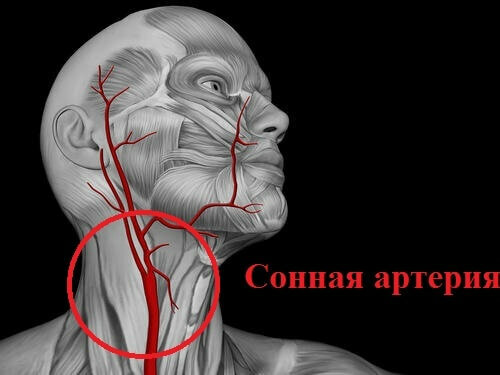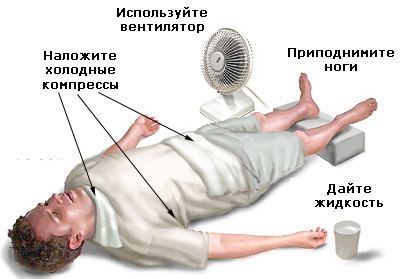Acute liver failure: symptoms, causes, emergency care
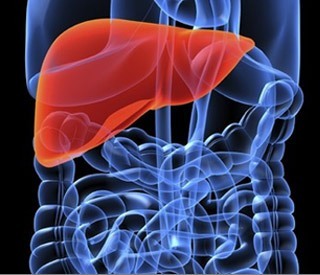 A single and clear definition of what acute liver failure( OPEN) still does not exist.However, based on modern knowledge of the mechanism of development of this severe pathology, it can be characterized as a clinical and laboratory syndrome, based on the mass destruction of liver cells, accompanied by a total decrease in all liver functions, increased intoxication and a powerful pathological effect on all body systems without exception.
A single and clear definition of what acute liver failure( OPEN) still does not exist.However, based on modern knowledge of the mechanism of development of this severe pathology, it can be characterized as a clinical and laboratory syndrome, based on the mass destruction of liver cells, accompanied by a total decrease in all liver functions, increased intoxication and a powerful pathological effect on all body systems without exception.
Treatment of acute liver failure cause of acute liver failure
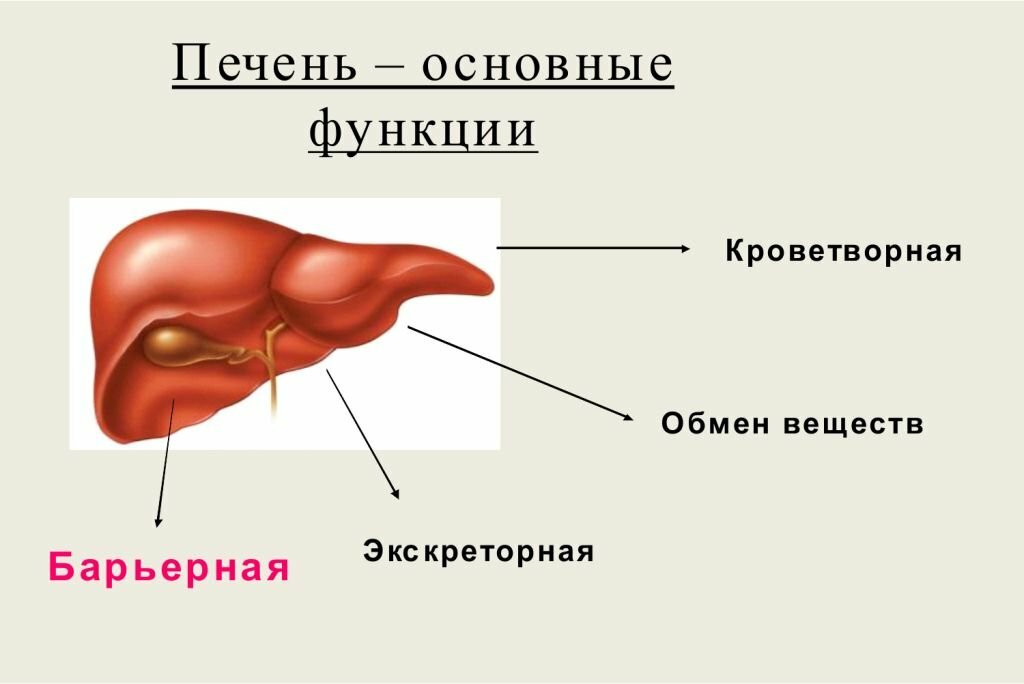
Based on the mechanism of development of Open can be divided into two basic forms:
- hepatocellular, due to the death of hepatocytes( liver cells) due to the direct destructive effect of a variety of factors;
- port-caval, in which hepatocytes die due to the fact that blood begins to pass by the liver, and she experiences oxygen starvation.
All causes of the development of OpeH can be conditionally divided into 5 groups:
- Liver diseases: hepatitis, cirrhosis, alveococcosis, malignant tumors - any pathology can provoke mass death of hepatocytes.In these cases, OPEN determines the biochemical and clinical picture of the disease.Among the diseases of this category, viral hepatitis most often cause insufficiency.
- Obturation of bile ducts.The blockage of the ducts leads to an increase in the pressure in them.As a result, blood and lymph circulation is disrupted, blood begins to search for bypasses, skirting the capillary network.The nutrition of the hepatocytes deteriorates, their death occurs.Diseases of other organs and systems.Pathology of blood vessels and heart, connective tissue diseases, endocrine diseases - in the course of their chronic course at some point, Opel may develop.
- Poisoning.There are many natural and artificial poisons that have an increased ability to affect the liver cells.These include:
- phalloidin, phalloin, beta-amanitine contained in poisonous fungi;
- various pesticides, insecticides, herbicides;
- solvents;
- medications.
- Damaging effects on the body.Injuries and diseases, accompanied by massive loss of fluid( bleeding, dehydration due to diarrhea, burns, etc.) lead to a deterioration in liver nutrition.The result is hypoxia and death of hepatocytes with the development of OPEN.Here, a role may also be played by allergic organism.
Symptoms of liver failure
The clinical picture of acute hepatic insufficiency is characterized by a wide variety of symptoms.This is due to the fact that the lesion affects not only the liver, but many other organs. In order to navigate in this diversity, doctors allocate certain syndromes.
- Nutrition, which indicates a drop in appetite, nausea, intolerance to certain types of food, dyspepsia, flatulence, upset of the stool, with fecal matter discolored, progressive weight loss, development of neuritis and anemia.
- Hepatic encephalopathy is a key syndrome of Opel, consisting in the defeat of the nervous system.There can be absolutely all symptoms of the violation of the functions of the central nervous system, from mild drowsiness, to deep inhibition and even coma.
- Fever with terminal liver disease sometimes reaches 40 ° C or more.It is associated exclusively with liver damage, although it may be a sign of sepsis.
- Jaundice is the second key symptom of liver failure.He is associated with a massive ejection of bile pigments from dead hepatocytes into the bloodstream.
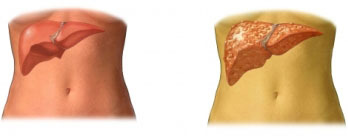
- Arterial hypotension, or lowering blood pressure, is due to increased production of biologically active substances that dilate blood vessels and provoke the development of bypass routes past the capillary bed.So the liver tries to improve its blood supply.
- Hepatic-pulmonary syndrome is based on the same principle.The result of this is turning off part of the blood vessels from the breathing process - the blood simply does not reach the capillaries of the pulmonary alveoli, moving from the arteries directly to the veins.For this reason, its saturation with oxygen decreases, dyspnea, cyanosis develops.
- Osteo-ascitic syndrome is caused by a decrease in the ability of the liver to synthesize albumin, the main proteins of the blood plasma, capable of retaining fluid in the vessels.As a result, water leaves the bloodstream and leaves in the tissue or cavity of the abdomen.The second mechanism for the development of this syndrome is the inactivation of aldosterone, a hormone involved in maintaining the water-electrolyte balance.
- Sweetish liver odor is a symptom specific for OPN, which arises from a metabolic disturbance of methionine, one of the amino acids.
- Hemorrhagic syndrome is associated with a decrease in the synthesis of substances involved in blood clotting.Violation of this ability leads to both a variety of bleeding, and, on the contrary, to thrombosis and even DIC syndrome.
- Endocrine disorders consist in the growth of the level of estrogen and are expressed in the development of atrophic changes in the male sex glands, infertility, the growth of mammary glands in men or their atrophy in women, hair loss, menstrual cycle disorders.
There is a special form of OPEN - fulminant , or lightning, in which in a relatively short time( less than 8 weeks).With it, liver encephalopathy and signs of a rapidly growing defeat of all other organs, beginning with the kidneys and ending with the cardiovascular system, are on the first place.The special gravity of the current of this particular form made it stand out in a separate category deserving the closest attention of hepatologists and resuscitators.
Complications of acute hepatic impairment
With a particularly malignant course of OPEH and / or lack of adequate treatment, the disease can trigger the development of complications such as:
-
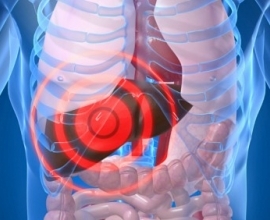 cerebral edema as a result of a disturbance in the regulation of the water-electrolyte balance;
cerebral edema as a result of a disturbance in the regulation of the water-electrolyte balance; - Gastrointestinal bleeding due to depletion of blood coagulation;
- infections of various locations due to a catastrophic fall in immunity;
- with fulminant form possibly development of hepato-renal syndrome with toxic necrosis of renal tubules, as well as lesions of the pancreas, heart, lungs.
Treatment of acute liver failure
Treatment of acute liver failure should begin as quickly as possible.This is the only way to improve the patient's condition and increase the chances of restoring liver function.
Therapeutic measures can be divided into the following areas:
-
 prophylaxis of hepatic encephalopathy and its treatment by dietotherapy, the appointment of lactulose, some antibiotics directed at suppressing the activity of microbes that produce nitrogenous substances;
prophylaxis of hepatic encephalopathy and its treatment by dietotherapy, the appointment of lactulose, some antibiotics directed at suppressing the activity of microbes that produce nitrogenous substances; - correction of carbohydrate-energy shifts by assigning glucose, insulin, riboxin;
- hepatoprotective therapy with Essential, hepasol-A, lipoic acid( these drugs protect hepatocytes from damaging effects, although they are not able to revitalize already dead cells);
- restoration of blood coagulation functions, for which use is Vikasol, Fraxiparin;
- restoration of impaired protein metabolism by infusion of albumin solution;
- antibiotic therapy, which is prescribed to suppress bacterial infection in the event of a threat or developed sepsis;
- normalization of blood pressure by infusion of saline solutions, and in case of failure - and pressor drugs such as dopamine;
- prevention and treatment of cerebral edema, which is performed with the help of diuretics such as mannitol;
- prophylaxis and treatment of ulcers of the digestive system, for which a quasatellite is prescribed;
- corticosteroid therapy is particularly effective in autoimmune liver damage, whereas in fulminant OPEN, its efficacy is extremely low;
- help the liver in terms of detoxification by forced diuresis, with the help of loop diuretics - furosemide in high doses in parallel with veroshpiron, as well as euphyllinum;
- with intoxication may require the use of antidotes;So, in case of paracetamol poisoning, the early administration of the acetylcysteine antidote in the first hours can protect against severe liver damage.
Note: acute liver failure is characterized by a prolonged course and a rather unfavorable prognosis.
Although the liver is able to regenerate fairly well, in some situations its capabilities are not enough.Therefore, the prevention of infection with hepatitis, poisoning with various poisons, including alcohol, timely treatment of chronic diseases is the best way to never know the symptoms of this serious illness.
You will receive exhaustive information on modern methods of diagnosis and treatment of acute hepatic diagnostics by viewing this video review:
Bozbey Gennadiy, medical reviewer, ambulance doctor

